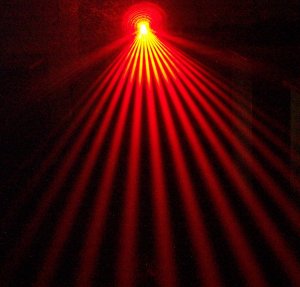 I recently became aware that while talking to my parents about my optics research, optics classes, and optics career aspirations, they had no idea what I was talking about. So, assuming that the physically uneducated masses are similarly in the dark about the definition of optics (pun intended), I will venture to give a palatable definition:
I recently became aware that while talking to my parents about my optics research, optics classes, and optics career aspirations, they had no idea what I was talking about. So, assuming that the physically uneducated masses are similarly in the dark about the definition of optics (pun intended), I will venture to give a palatable definition:The physical field of optics is huge - it encompasses much more than the common person supposes. From simple everyday phenomena like colors, mirrors, cameras, computer screens, eyeballs, and eye-glasses, to technologically vital applications like lasers, microscopes, x-rays, satellite dishes, radios, and (of course) microwave ovens, you use light and all of its complicated electromagnetic theory constantly (heh heh, literally if you're reading this with eyeballs).
Optics has such a significant impact on your life you likely don't even realize it: You regularly use heatlamps, fiber optics (internet), DVDs, laser pointers, and laser printers. Not to mention you get sunburns, suntans, use sunglasses, and watch TV.
Some of the more subtle applications of optics include computer chip manufacturing, radar, digital camera CCD chips, WiFi, cell phones transmissions, and toaster ovens (well, maybe toasters aren't so vital).
I could keep going and mention how the upper atmosphere keeps us safe from nasty particles and high-energy cosmic rays by playing tricky optics games, or why some cars have blue headlights while most have orange. Or I could mention the color of the sky, the color of snow, or why the sun is so stinking bright. But I won't. I bet by now you realize you underestimated those funny little photons and all they do for you, didn't ya? So thank God for photons! (And for folks who understand them.) Cause the world would be awfully bleak without them.
(For the record, please don't ask me how rainbows work - they're so freaking hard to understand!)



No comments:
Post a Comment